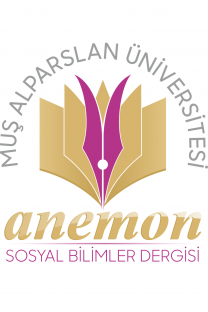Fas Krallığında Dinin Kurumsallaşması: Yüksek Âlimler Konseyi
The Institutionalization of Religion in The Kingdom of Morocco: The Supreme Council of Scholars
___
- Abouyoub, Y. (2012). Peut-on parler d’exception marocaine ? Tumultes, 38-39(1-2), 93-113. https://doi.org/10.3917/tumu.038.0093
- Au Maroc, le soft power passe par l’école des imams. (t.y.). Libération. https://www.liberation.fr/planete/2016/12/19/au-maroc-le-soft-power-passe-par-l-ecole-des-imams_1536330/ Erişim tarihi: (6 Haziran 2023).
- Baylocq, C., Hlaoua, A., & Stout, C. (2016). Spreading a “Moderate Islam”? Morocco’s New African Religious Diplomacy. Afrique contemporaine, 257(1), 113-128.
- Belal, Y. (2013). L’islam politique au Maroc. Pouvoirs, 145(2), 71-81. https://doi.org/10.3917/pouv.145.0071
- Boukous, A. (1998). Mohammed Mokhtar Soussi. Figure emblématique de la différence. NAQD, 11(1), 101-118. https://doi.org/10.3917/naqd.011.0101
- Bruce, B. (2019). Governing Islam Abroad: Turkish and Moroccan Muslims in Western Europe (1st ed. 2019). Springer International Publishing : Imprint: Palgrave Macmillan. https://doi.org/10.1007/978-3-319-78664-3
- Bruce Benjamin. (2015). Governing Islam Abroad The Turkish and Moroccan Muslim Fields in France and Germany [Doctorat en Science politique]. Institut d’Etudes Politiques de Paris.
- Ceran, İ. (2012). Fas Tarihi (1er édition). Türk Tarih Kurumu.
- Discours de SM le Roi à l’occasion de la Fête du Trône. (2013, Mart 25). Maroc.ma. https://www.maroc.ma/fr/discours-royaux/discours-de-sm-le-roi-%C3%A0-loccasion-de-la-f%C3%AAte-du-tr%C3%B4ne-0
- El-Katiri, M. (2013). The institutionalisation of religious affairs: Religious reform in Morocco. The Journal of North African Studies, 18(1), 53-69. https://doi.org/10.1080/13629387.2012.712886
- elKettani. (t.y.). Le Conseil supérieur des Oulémas condamne fermement le contenu du film “Saydiat Al Jannah’’.http://www.habous.gov.ma/fr/conseil-supérieur-des-oulémas-2/6442-le-conseil-supérieur-des-oulémas-condamne-fermement-le-contenu-du-film-“saydiat-al-jannah.html (Erişim Tarihi: 6 Haziran 2023).
- Erol, H. (2022). Islamic Propaganda by the French During the Occupation of Egypt (1798-1801). İstanbul Üniversitesi Sosyoloji Dergisi / İstanbul University Journal of Sociology, 42(1), 163-190. https://doi.org/10.26650/SJ.2022.42.1.0014
- Geertz, C., & Şahin, M. M. (2012). İki Kültürde İslam: Fas ve Endonezya’da Dini Değişim: Fas ve Endonezya'da Dini Değişim (1. bs, C. 1). Küre Yayınları.
- Hamouda. (t.y.-a). Conseil supérieur des Oulémas.http://www.habous.gov.ma/fr/conseil-supérieur-des-oulémas.html (Erişim Tarihi: 6 Haziran 2023).
- Hamouda. (t.y.-b). La 26e session ordinaire du Conseil Supérieur des Oulémas approuve une série de recommandations. http://www.habous.gov.ma/fr/conseil-supérieur-des-oulémas-2/5240-la-26e-session-ordinaire-du-conseil-supérieur-des-oulémas-approuve-une-série-de-recommandations.html (Erişim Tarihi: 6 Haziran 2023)
- Hamouda. (t.y.-c). Message de fidélité et de loyalisme à SM le Roi, Amir Al Mouminine, à l’occasion de la clôture de la 18eme session ordinaire du Conseil Supérieur des Ouléma. http://www.habous.gov.ma/fr/conseil-supérieur-des-oulémas-2/2140-message-de-fidélité-et-de-loyalisme-à-sm-le-roi,-amir-al-mouminine,-à-l-occasion-de-la-clôture-de-la-18eme-session-ordinaire-du-conseil-supérieur-des-ouléma.html ( Erişim Tarihi: 06 Haziran 2023).
- Hodgson, G. M. (2006). What Are Institutions? Journal of Economic Issues, 40(1), 1-25.
- Johansen, B. (1988). Des institutions religieuses du Maghreb. Arabica, 35(3), 221-252.
- Kadir Canatan. (2012). Bilgi Sosyolojisi Açısından “İslam’ın Kurumsallaşması”. Eskiyeni, 24, 67-82.
- Lapidus, I. M., Ayyıldızoğlu, M., & Aktay, Y. (2010). İslam Toplumları Tarihi Cilt 2: 19 Yüzyıldan Günümüze (5. bs, C. 2). İletişim Yayınları.
- Larousse, É. (t.y.). Définitions: Baraka - Dictionnaire de français Larousse. https://www.larousse.fr/dictionnaires/francais/baraka/7906 (Erişim Tarihi: 31 Mayıs 2023).
- Le Maroc compte 50.000 mosquées dont le budget est de 2 milliards de DH/an. (2014, Aralık 1). Médias24. https://medias24.com/2014/12/01/le-maroc-compte-50-000-mosquees-dont-le-budget-est-de-2-milliards-de-dh-an/
- L’« exception marocaine » dans le contexte des soulèvements arabes. (t.y.). IRIS. https://www.iris-france.org/43267-l-exception-marocaine-dans-le-contexte-des-soulevements-arabes/ (Erişim Tarihi: 03 Haziran 2023).
- Miller, S. G. (2013). A History of Modern Morocco. Cambridge University Press. https://doi.org/10.1017/CBO9781139045834
- Rollinde, M. (2004). L’alternance démocratique au Maroc: Une porte entrouverte. Confluences Mediterranee, N°51(4), 57-67.
- Saghi, O. (2012). Une exception marocaine ? Les Cahiers de l’Orient, 107(3), 151-153. https://doi.org/10.3917/lcdlo.107.0151
- Soage, A. (2013). Political Islam in Morocco: Is there an ‘exception marocaine’? Middle East Review of International Affairs, 17, 1-8.
- Tozy, M. (1999). Monarchie Et Islam Politique Au Maroc, Édition Française (2e éd. suivie d'une postface édition). Les Presses de Sciences Po.
- Tozy, M. (2009). L’évolution du champ religieux marocain au défi de la mondialisation. Revue internationale de politique comparee, Vol. 16(1), 63-81.
- Tozy, M. (2013a). 5. Des oulémas frondeurs à la bureaucratie du « croire ». Les péripéties d’une restructuration annoncée du champ religieux au Maroc: İçinde La bureaucratisation néolibérale (ss. 129-154). La Découverte. https://doi.org/10.3917/dec.hibou.2013.01.0129
- Vermeren, P. (2016a). II. Mohammed V et l’Istiqlâl (1956-1961): C. 5e éd (ss. 20-31). La Découverte. https://www.cairn.info/histoire-du-maroc-depuis-l-independance--9782707190659-p-20.htm
- Vermeren, P. (2016b). VI. D’Ahmed Dlimi à Driss Basri, le Maroc des « années de plomb » (1975-1990): C. 5e éd (ss. 69-85). La Découverte. https://www.cairn.info/histoire-du-maroc-depuis-l-independance--9782707190659-p-69.htm
- Wainscott, A. M. (2018). Bureaucratizing Islam: Morocco and the War on Terror. Cambridge University Press.
- Wyrtzen, J. (2015). Making Morocco: Colonial intervention and the politics of identity. Cornell University Press.
- Wyrtzen, J. D. (2009). Constructing Morocco: The colonial struggle to define the nation 1912-1956 [Thesis, Georgetown University]. Içinde Dept. Of History, Doctoral dissertations, 2009. https://repository.library.georgetown.edu/handle/10822/553117
- Yayın Aralığı: 3
- Başlangıç: 2013
- Yayıncı: Muş Alparslan Üniversitesi
İcat Edilen Miras: Fas Milliyetçiliğinde Geleneğin Yeniden Keşfi
Fuad SELAMZADE, Özgür YEŞİLYURT
Batı Afrika’nın Bilinen İlk Devleti; Gana (Gâne) İmparatorluğu
Afrika Turizmi Üzerine Bir Bibliyometrik Analiz
Oğuzhan KODALAK, Elif ASLANTÜRK, Mahmut BALTACI
Mauritius Adası Kolonyal ve Postkolonyal Dönem Mirası ve Mirasın Korunmasına Yönelik Çalışmalar
Ulus Dönüşüm Sürecinde Pan-Afrikanist Bir Liderlik Örneği: Burkina Faso ve Thomas Sankara
Fas Krallığında Dinin Kurumsallaşması: Yüksek Âlimler Konseyi
Nigeria: The Effects of Identity Politics on Societal Security
The 2012 Tuareg-Arab Uprising in Northern Mali and Regional Actors: The Impact of Libya and Algeria
